APEC Malaysia Summit November 2020: Report
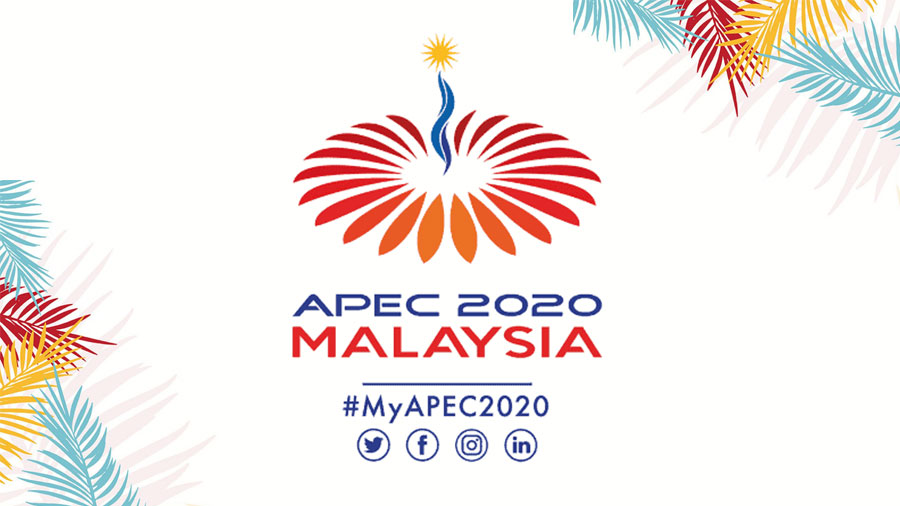
- 21 Asia-Pacific Presidents & Prime Ministers discuss development of Free Trade & Interconnectivity
- Work continuing on potential FTAAP Free Trade Agreement
- Covid-19 vaccine and food security supply chains being developed
- Commitment to Digitization Innovation, Infrastructure and ECommerce
- Trumps speech remains off the record, Asian hopes for better engagement from Biden
Op/Ed by Chris Devonshire-Ellis
APEC 2020 ended on Friday with the adoption of the “APEC Putrajaya Vision 2040” and the 2020 Kuala Lumpur Declaration at this years APEC Economic Leaders’ Meeting (AELM) hosted by Malaysia. Chaired by Malaysian Prime Minister Tan Sri Muhyiddin Yassin, the AELM was participated by all 21 APEC Economic Leaders. This included the Presidents of Chile, China, Indonesia, South Korea, Peru, Philippines, Russia, the United States; the Prime Ministers of Australia, Canada, Japan, Malaysia, New Zealand, Papua New Guinea, Singapore, Thailand, Vietnam, the Sultan of Brunei, the Chief Executive of Hong Kong, Economic Minister of Mexico, and the Representative of the President of Taiwan.
APEC is an inter-governmental forum for 21 member economies in the Pacific Rim that promotes Free Trade throughout the Asia-Pacific region, and began in 1989, in response to the growing interdependence of Asia-Pacific economies and the advent of regional trade blocs in other parts of the world. APEC aims to establish new markets for agricultural products and raw materials beyond Europe. Headquartered in Singapore, APEC is recognized as one of the highest-level multilateral blocs and oldest forums in the Asia-Pacific region, and exerts a significant global influence.
APEC’s member economies are home to around 2.9 billion people and represent approximately 60% of global GDP and 48% of world trade. Total GDP of APEC nations was about USD 50.2 trillion in 2019.
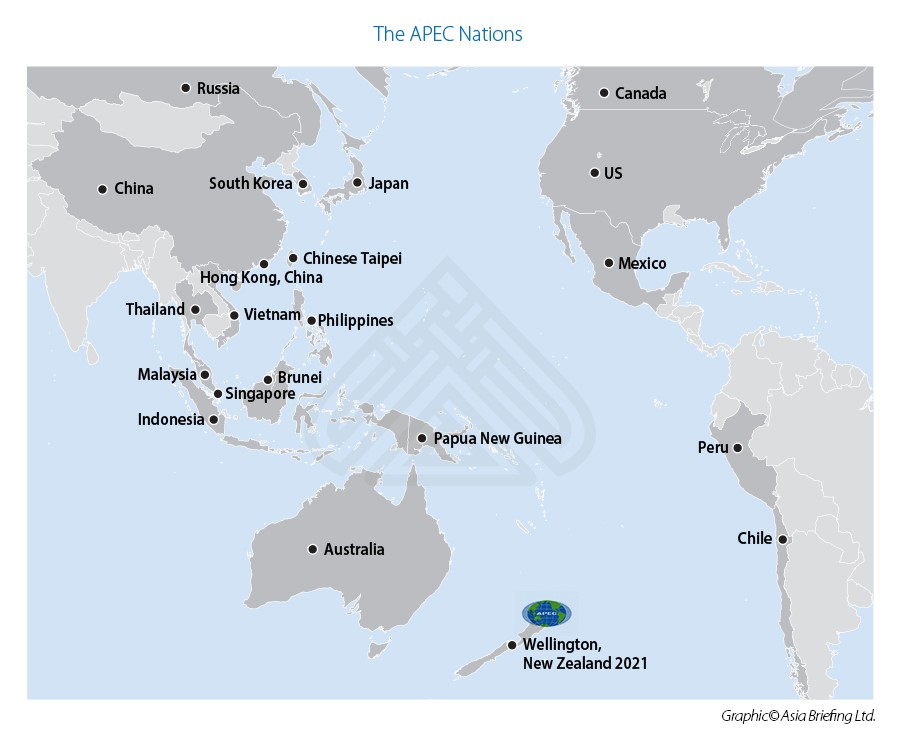
The APEC Putrajaya Vision 2040 is an extended continuation of 1994’s Bogor Goals, which reach maturity this year. The Putrajaya Vision aspires for an open, dynamic, resilient and peaceful Asia-Pacific community by 2040 for the prosperity of all its people and future generations. In doing so, it identifies three key economic drivers to achieve this aspiration:
Trade and Investment
To ensure that the Asia-Pacific remains the world’s most dynamic and interconnected regional economy, we acknowledge the importance of, and will continue to work together to deliver, a free, open, fair, non-discriminatory, transparent and predictable trade and investment environment. We reaffirm our support for agreed upon rules of the WTO in delivering a well-functioning multilateral trading system and promoting the stability and predictability of international trade flows. We will further advance the Bogor Goals and economic integration in the region in a manner that is market-driven, including through the work on the Free Trade Area of the Asia-Pacific (FTAAP) agenda which contributes to high standard and comprehensive regional undertakings. We will promote seamless connectivity, resilient supply chains and responsible business conduct.
Innovation and Digitization
To empower all our people and businesses to participate and grow in an interconnected global economy, we will foster an enabling environment that is, among others, market-driven and supported by digital economy and innovation. We will pursue structural reforms and sound economic policies to promote innovation as well as improve productivity and dynamism. We will strengthen digital infrastructure, accelerate digital transformation, narrow the digital divide, as well as cooperate on facilitating the flow of data and strengthening consumer and business trust in digital transactions.
Strong, Balanced, Secure, Sustainable and Inclusive Growth
To ensure that the Asia-Pacific region is resilient to shocks, crises, pandemics and other emergencies, we will foster quality growth that brings palpable benefits and greater health and wellbeing to all, including MSMEs, women and others with untapped economic potential. We will intensify inclusive human resource development as well as economic and technical cooperation to better equip our people with the skills and knowledge for the future. We will promote economic policies, cooperation and growth which support global efforts to comprehensively address all environmental challenges, including climate change, extreme weather and natural disasters, for a sustainable planet.
In addition to the Putrajaya Vision, the leaders also adopted a consensus Declaration, a document that has remained elusive in the past two years, mainly due to issues related to an inability to agree wording during the US-China trade war. This year however the leaders present were able to reach consensus, signing off the Kuala Lumpur Declaration.
This calls for:
Combatting and Mitigating the Impacts of COVID-19
We will continue to work together to use all available policy tools to support an inclusive, effective and sustained response to COVID-19, minimizing its impact on people’s livelihoods.
We recognize the need to enhance stimulus measures that facilitate economic recovery and job creation. In facilitating economic recovery, we underscore the importance of improving fiscal sustainability and transparency to support long-term resilient economic growth and future financing needs.
We acknowledge the need to support developing economies in combatting COVID-19. We also welcome the recent establishment of a digital platform for coordinated information sharing on policy responses related to COVID-19. We commend the varied and continued efforts as well as the contribution of additional resources across APEC to combat the pandemic and support workers and sectors through the economic recovery process.
We will cooperate to facilitate the movement of essential goods and services, as well as the essential movement of people in a safe manner, identifying and resolving unnecessary barriers to trade and strengthening the resilience of our supply chains. We recognize the importance of working together to ensure trade and investment can continue to flow in these trying times. We are encouraged by the implementation of measures that facilitate trade and urge Economies to ensure emergency trade measures designed to tackle COVID-19 are consistent with World Trade Organization (WTO) rules.
We recognize that science, technology and innovation are important to the region’s post-COVID-19 recovery. We reaffirm the need to cooperate constructively on COVID-19 including the research and development, production, manufacturing and distribution of diagnostic tests, essential medical products and services, therapeutics and vaccines. We highlight the importance of facilitating equitable access to safe, quality, effective and affordable vaccines and other medical countermeasures that are vital to safeguard people’s health and well-being, while incentivizing innovation.
We acknowledge that the role of extensive immunization against COVID-19 is critical in order to bring the pandemic to an end. We recognize the importance of the development and contribution of digital technologies in safeguarding people’s health and protecting the region from health threats, and enhancing resilience, scalability and sustainability of health systems, thereby moving towards universal health coverage.
Improving the Trade and Investment Narrative
We welcome the significant progress made under the Bogor Goals, including the final review of APEC’s Progress towards the Bogor Goals, in facilitating trade and investment, and recognize more needs to be done in fostering an enabling environment for trade and investment in the Asia-Pacific region.
We recognize the importance of a free, open, fair, non-discriminatory, transparent and predictable trade and investment environment to drive economic recovery at such a challenging time. In this regard, we reaffirm our support for agreed-upon rules of the WTO in promoting the stability and predictability of international trade flows. We take note of the call of the APEC Business Advisory Council (ABAC) for APEC to continue supporting the multilateral trading system.
We will continue to support the on-going work at the WTO, including through its necessary reform aimed to improve its functioning, and will continue to work on appropriate capacity building initiatives to implement WTO agreements. We call for expedited progress in the on-going WTO negotiations on fisheries subsidies. APEC member participants in Joint Statement Initiatives (JSI) call for progress in the lead-up to the 12th WTO Ministerial Conference (MC12), recognizing the e-commerce initiative is particularly important in supporting COVID-19 recovery.
We will further advance the economic integration in the region, in a manner that is market-driven, including through the work on the Free Trade Area of the Asia-Pacific (FTAAP) agenda, which will contribute to high quality and comprehensive regional undertakings. We underscore the importance of improving regional connectivity through quality infrastructure development and investment based upon relevant APEC work.
Inclusive Economic Participation through Digital Economy and Technology
Innovation and digitization enable governments, businesses and people to carry out their activities and empower inclusive economic participation by all. We will foster an enabling environment for the development of the digital economy, including to open new opportunities for Micro, Small and Medium Enterprises (MSMEs). We aim to promote innovative technologies and foster a reliable, interoperable, open, accessible and secure ICT environment, narrow the existing digital, skills and regulatory gaps, and encourage development in digital infrastructure and transformation. We acknowledge the importance of cooperation in facilitating the flow of data and strengthening consumer and business trust in digital transactions.
We recognize the disproportionate impacts of COVID-19 on MSMEs, women and others with untapped economic potential. We intend to pursue inclusive economic policies that support their recovery and growth through effective and equal participation in economic activities and opportunities to contribute to economic recovery efforts. We support and welcome the implementation of the La Serena Roadmap for Women and Inclusive Growth.
COVID-19 has transformed the way we work and accelerated the transitions to the future of work setting. We recognize the need for continued structural reforms to improve the ways of doing business and unleash economic prosperity for our people, including accelerating cooperation on digital literacy and skills development to harness technological transformation, and encouraging the use of digital technology to resolve cross-border business-to-business disputes. We aim to advance efforts to promote human resource development, and strengthen economic and technical cooperation, to ensure all affected economic sectors and workers are afforded appropriate support in expediting their economic recovery. We are encouraged by the broader on-going efforts on economic, financial and social inclusion that contribute to narrowing the gap in economic development, and advance the well-being for all, in support of global efforts, including the 2030 Agenda for Sustainable Development.
Driving Innovative and Inclusive Sustainability
We will foster comprehensive quality growth and advance work to this effect, including on the APEC’s human security agenda, in order to recover from COVID-19. We reaffirm our support for economic and technical cooperation, as well as structural reforms, that drive innovation, productivity and sustainable growth. We encourage inclusive recovery from COVID-19 that increases employment and economic activity. Recognizing the impact of COVID-19 on global food supply chains, we will work to ensure food security through sufficient, safe, and nutritious food that continues to be available and accessible to people across the region, while reducing food loss and waste.
We will collaborate to facilitate access to affordable energy, enhance energy resilience and energy security using the widest variety of fuels and technologies to support sustainable economic growth and promote transitions to cleaner energy as part of a strong and inclusive economic recovery.
We are hopeful that new technologies are available and accessible to allow us to handle resources and waste more sustainably, and in a holistic manner. We will promote economic policies and growth that support global efforts to tackle climate change, extreme weather and natural disasters, and strengthen emergency preparedness.
Summary
This years APEC was much less fraught than previous years, with a more conciliatory atmosphere. This year’s host, Malaysian Prime Minister Muhyiddin Yassin, said that the U.S.-China trade war that had hampered talks in the past has “been eclipsed” by the COVID-19 pandemic. Growth in the Asia-Pacific region is expected to slump 2.7% this year, from a 3.6% growth in 2019, and he stated that APEC’s focus was on accelerating economic recovery and developing an affordable vaccine. APEC’s members account for 60% of global GDP, and have also “pledged to refrain from backtracking and resorting to protectionist measures to keep markets and borders open.”
US President Trumps Speech To APEC 2020
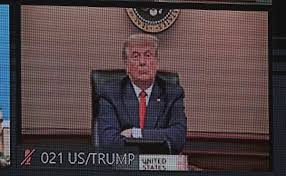
President Trump’s participation on Friday, his first at APEC since 2017, came as a surprise as last week he skipped the East Asia Summits and withdrew from speaking at an APEC CEO meeting. Trump addressed the meeting but his speech wasn’t immediately available. A White House statement concerning his address can be read here. It is thought that Trumps’s appearance was mainly to prevent China from taking the lead in Asia-Pacific affairs. He also refused to use the official APEC backdrop for his speech, using a plain brown background. Global markets and APEC leaders are unlikely to react to a speech by Trump, whose term is expected to end in January. Instead, their attention has already moved on to president-elect Joe Biden.
Chinese President Xi Jinping’s Speech To APEC 2020
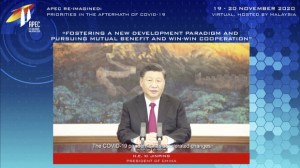
China’s President Xi Jinping, in his remarks, urged countries to “defend multilateralism” and called for the establishment of an “Asia-Pacific free trade zone at an early date.” He told the meeting that Beijing would also “actively consider” joining the Comprehensive and Progressive Agreement for Trans-Pacific Partnership, a trade agreement that includes Japan, Canada, Mexico and other regional economies but not the United States. Trump pulled out of the CPTPP’s predecessor, the Trans-Pacific Partnership, which never took effect.
President Xi’s speech to APEC can be read here.
Russian President Vladimir Putin’s Speech To APEC 2020
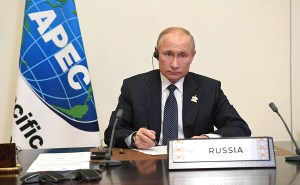
Russian President Vladimir Putin said on Friday at the APEC summit that millions of people may drop into poverty because of the coronavirus pandemic. “Alarming trends are observed in the economy and social sphere, due to the decline in industrial production and financial troubles, tens of millions of people are at risk of falling below the poverty line.”
To help the most vulnerable nations, Putin once again suggested organizing “green corridors” free of restrictions and sanctions on food and medical supplies. The United States has been against this as it sees it as a ploy to escape sanctions imposed on Russia.
“We believe that the implementation of this initiative would contribute not only to the relief of the humanitarian situation in the world, but also to the development of global trade” Putin continued. He also expects an escalation of economic contradictions between key global players because of the pandemic and stressed Russia is ready to work with everyone to prevent tensions. He expressed a readiness to share Russia’s experience in fighting the virus and developing anti-virus vaccines.
“I would like to remind you that two vaccines have been created and registered in Russia: Sputnik V and EpiVacCorona. The third vaccine is in the final stage of testing. Together with our foreign partners, we are actively working on the possibilities of their supply and localization of production in third countries.” he said.
President Putin’s speech can be read in full here.
Other Comments
Speaking by video link from Tokyo to the meeting of APEC CEOs, Japanese Prime Minister Yoshihide Suga said Japan will “aspire for the Free Trade Area of the Asia-Pacific.”
New Zealand Prime Minister Jacinda Ardern, who will be next year’s APEC host, voiced hope that APEC leaders will join hands to bolster the regional economy. “As we confront this generation’s biggest economic challenge, we must not repeat the mistakes of history by retreating into protectionism. APEC must continue to commit to keeping markets open and trade flowing,” she said.
Joe Biden: The TPP, RCEP & Asian Free Trade Agreements Potential
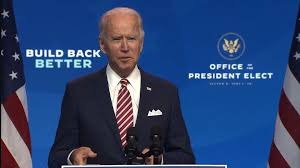
Next year, under the Joe Biden Presidency, it appears possible that the Asia-Pacific may be able to welcome back a more involved United States – there are signs from his pending administration that Free Trade goals, including a reassessment of the Trans-Pacific Partnership with an aim to rejoining it may well be on the longer term agenda – once he can fix the United States manufacturing and consumer base post Covid. Although Biden is not generally recognized as a proponent of Free Trade, at present the United States has been omitted from last week’s US$186 billion RCEP deal and under Trump had pulled out of the TPP, leaving it with no free trade agreements in the entire Asian region. That is counter-productive in getting cheaper Asian manufactured component parts into US finished products and brands.
A Biden win has come as a sigh of relief for Asian economies. They can look forward to a less confrontational and more predictable regime in Washington D.C. that’s more likely to engage in talks to iron out differences than unilaterally launch trade wars. However, as my colleague Dustin Daugherty pointed out in this weeks’ Dezan Shira & Associates opinion piece, do not expect existing trade policies to change significantly under Biden, or at least in the short term. The focus is likely to remain on boosting domestic industries as envisaged by his “Made In All of America” initiative. The economic crisis brought about by the COVID-19 pandemic that has left millions jobless in the US is only going to push Biden to push this policy to a far greater extent. That means Biden is unlikely to negotiate any trade agreements until significant investments in US manufacturing are made. It will be interesting to see how far he is prepared to talk about TPP – at next year’s APEC.
Related Reading
- 15th East Asia Ministerial Summit, November 2020 – Review
- BRICS Annual Summit November 2020 – Review
- Is the TPP Dead, or Will it Merge into the Free Trade Area of the Asia-Pacific?
About Us
Silk Road Briefing is written by Dezan Shira & Associates. The firm has 28 offices throughout Asia, and assists foreign investors into the region. For strategic advisory and business intelligence issues please contact the firm at silkroad@dezshira.com or visit www.dezshira.com





